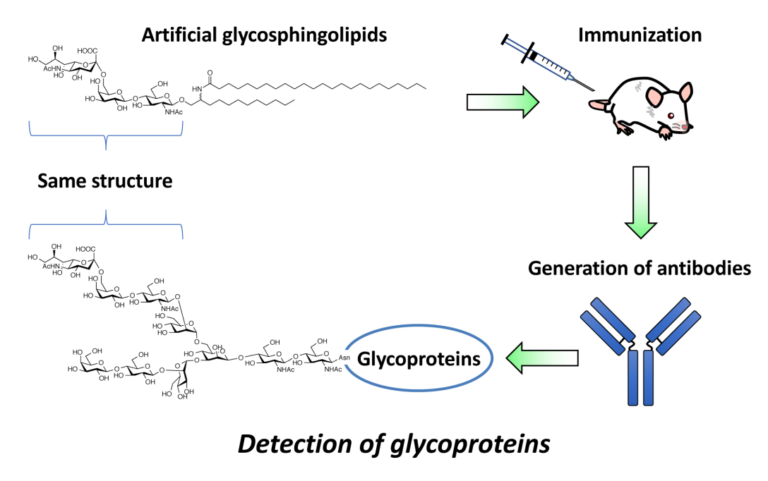Glycosphingolipids (GSLs) are cell membrane components composed of oligosaccharides and ceramides. Oligosaccharides and ceramides in GSLs are structurally diverse, and recent studies have revealed that GSLs containing very-long-chain fatty acids (VLCFAs) in the ceramide portion are involved in immune responses in mammalian tissues. Our study focuses on the role for GSLs in adaptive immune response and the effect of diets on tissue GSL metabolism.
(1) Induction of adaptive immune responses by glycosphingolipids containing very-long-chain fatty acids.
GSLs containing VLCFAs regulate several immune responses, such as cytokine production, immune signaling, and antibody induction. We found that immunization with GSLs containing VLCFAs can efficiently induce the production of anti-glycan antibodies by B cells. Based on this finding, we have developed artificial GSLs which can specifically induce adaptive immune responses and promote antibody production by B cells. The technology can be utilized to develop anti-glycoprotein antibodies and cancer vaccines targeting tumor-associated carbohydrate antigens [Ref.1].

(2) Diet and Ganglioside Expression.
Gangliosides are series of GSLs containing sialic acids in the oligosaccharide portion in mammalian cells. Gangliosides are a component of cellular membranes and play roles in modulating membrane function and the activity of membrane proteins. Abnormal expression and metabolism of gangliosides lead to the onset of several conditions in humans, such as neurologic diseases, diabetes, and cancer. A number of studies have been carried out to date to investigate the role of gangliosides in these diseases, and the effect of diet on tissue expression of gangliosides has recently become a topic of interest in this field. As gangliosides are degraded in the intestinal tract, ingested food-derived gangliosides are not directly absorbed into tissues in vivo, but the degradation products can be absorbed and affect ganglioside expression in the tissues. Recent studies have also shown that the expression of gangliosides in tissue cells can be indirectly induced by controlling the expression of ganglioside metabolism-related genes via the diet. Our study focuses on the dietary control to regulate the expression levels of gangliosides in tissues, which is expected to play a role in preventing and treating ganglioside-related diseases[Ref.2].
References
- Induction of specific adaptive immune responses by immunization with newly designed artificial glycosphingolipids. Sci. Rep. 2019, 9, 18803.
- Dietary Control of Ganglioside Expression in Mammalian Tissues. Int. J. Mol. Sci. 2020, 21(1), 177.

